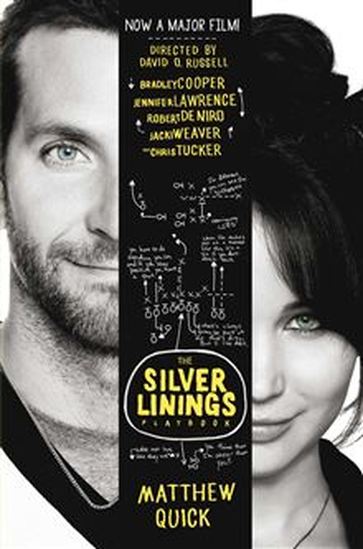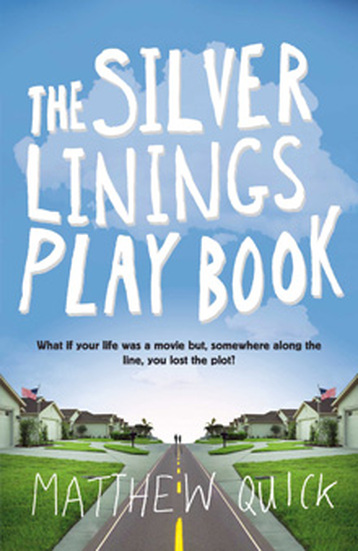|
How entertaining? ★★★☆☆
Thought provoking? ★★☆☆☆ 14 November 2012
This a book review of THE SILVER LININGS PLAYBOOK. |
“You can tell Fitzgerald never took the time to look up at clouds during sunset, because there’s no silver linings at the end of that book, let me tell you,” Pat
THE SILVER LININGS PLAYBOOK has movie adaptation written all over it, and through it. The first person perspective narrative regularly references cinema, while also stating that he, Pat Peoples, views his life as a movie. Now this novel has been put up onto the screen. Fortunately it had the tremendous writing-directing talent of David O. Russell to shepherd it. I caught it at a surprise screening, and was very entertained – a restlessly energetic rom-com of the highest order, something that Cary Grant, Katherine Hepburn or James Stewart might have participated in, in their youth. And those drawn to the source, as a result, will unfortunately be disappointed. Both the film and the book suffer from a superficial look at mental illness, but on an enjoyment level the novel suffers in comparison. The latter has none of the wit or charisma of the former. In their place are repetition, and the vexing quality of characters crying a lot instead of emotional complexity.
THE SILVER LININGS PLAYBOOK has movie adaptation written all over it, and through it. The first person perspective narrative regularly references cinema, while also stating that he, Pat Peoples, views his life as a movie. Now this novel has been put up onto the screen. Fortunately it had the tremendous writing-directing talent of David O. Russell to shepherd it. I caught it at a surprise screening, and was very entertained – a restlessly energetic rom-com of the highest order, something that Cary Grant, Katherine Hepburn or James Stewart might have participated in, in their youth. And those drawn to the source, as a result, will unfortunately be disappointed. Both the film and the book suffer from a superficial look at mental illness, but on an enjoyment level the novel suffers in comparison. The latter has none of the wit or charisma of the former. In their place are repetition, and the vexing quality of characters crying a lot instead of emotional complexity.
|
|
|
We meet the narrator as his mother is taking him out of a neural health facility. Pat thinks he’s been there a few months, but we come to find out it’s actually been several years. Not till near the end do we receive the reason for why he was incarcerated. Pat’s voice is similar to that of THE CURIOUS INCIDENT OF THE DOG IN THE NIGHT-TIME, except not in the same league of writing accomplishment. What is wrong with Pat? There’s no explanation or analysis as to his mental health; and that feels shoddy, and often undermines what is being told - on one level Pat appears to empathise/sympathise with those around him, on another his emotional development seems to have been re-set to a child-like innocence; or learning about life for the first time, like an alien crash landing on the planet (compare STARMAN). He has some kind of mild amnesia, and can't recall the last few years. And there is rage-filled outbursts and plenty of tears.
To contrast the adaptation, the bundles of charm and winsome screen personas of Bradley Cooper, Jennifer Lawrence, Robert De Niro and Jacki Weaver can paper over the weak characterisations that the novel has no recourse to. However, there is the disquieting sense in both versions that mental illness is being used to give the dramatis personae quirks.
Through bit-size chapters, the ambition of Pat is to reconcile with his separated wife, Nikki. He acknowledges he was a neglectful and lazy husband, and let himself go physically. And one of the big positives of THE SILVER LININGS PLAYBOOK is the protagonist’s focus and desire to better himself. He carries out an inspiring physical training regimen; and also undertakes to read the modern classic novels on Nikki’s teaching syllabus. Then Tiffany pops into his life, someone who is troubled emotionally, and the signposts for the main plot’s climax are laid out brightly.
Before publication, the book needed more re-writes; for instance, excise the grating repetitiveness of ideas and phrases (especially "the bad place", "apart time"). About halfway through, God is mentioned, but then his belief system is not explored. Typical of the whole experience, we are told stuff, and there is only a cursory examination. I kept contrasting THE CURIOUS INCIDENT OF THE DOG IN THE NIGHT-TIME – tight, thoughtful, emotional and with gripping prose.
Moments of entertaining writing, and uplifting and motivational self-betterment theme, are not enough to wholeheartedly recommend.




